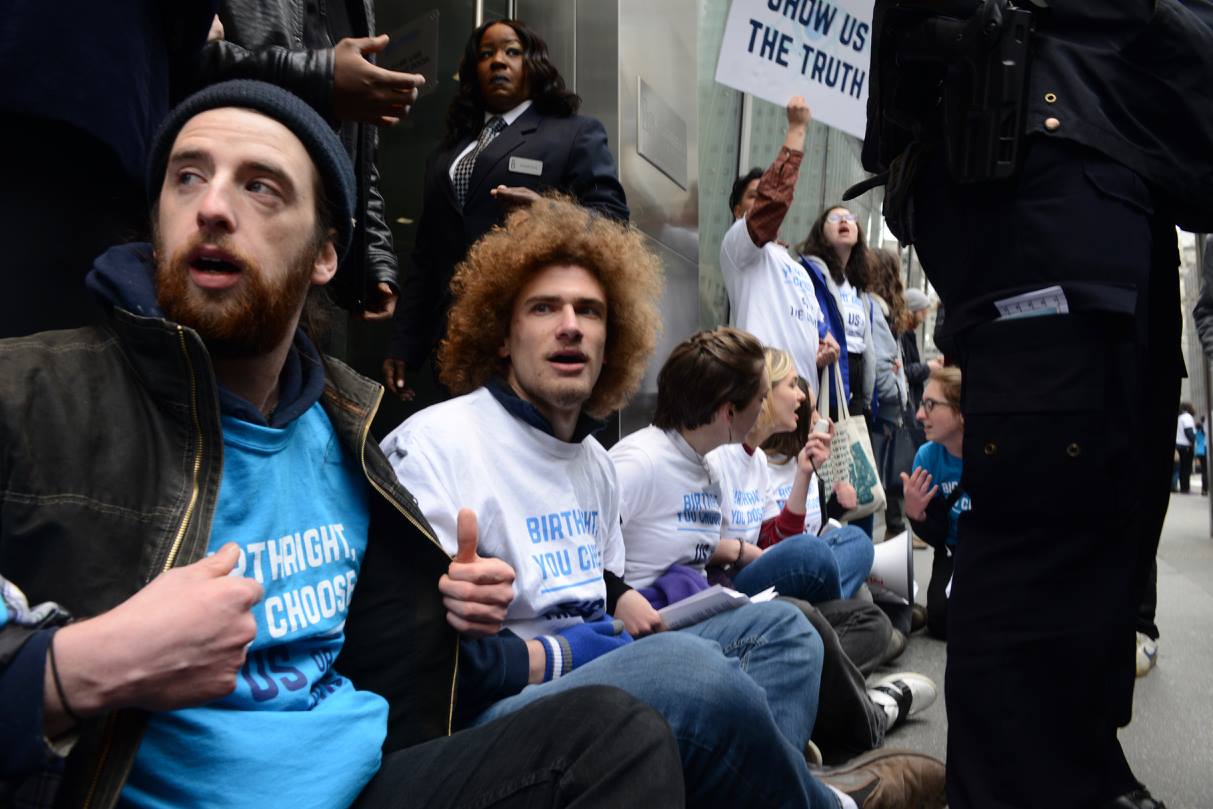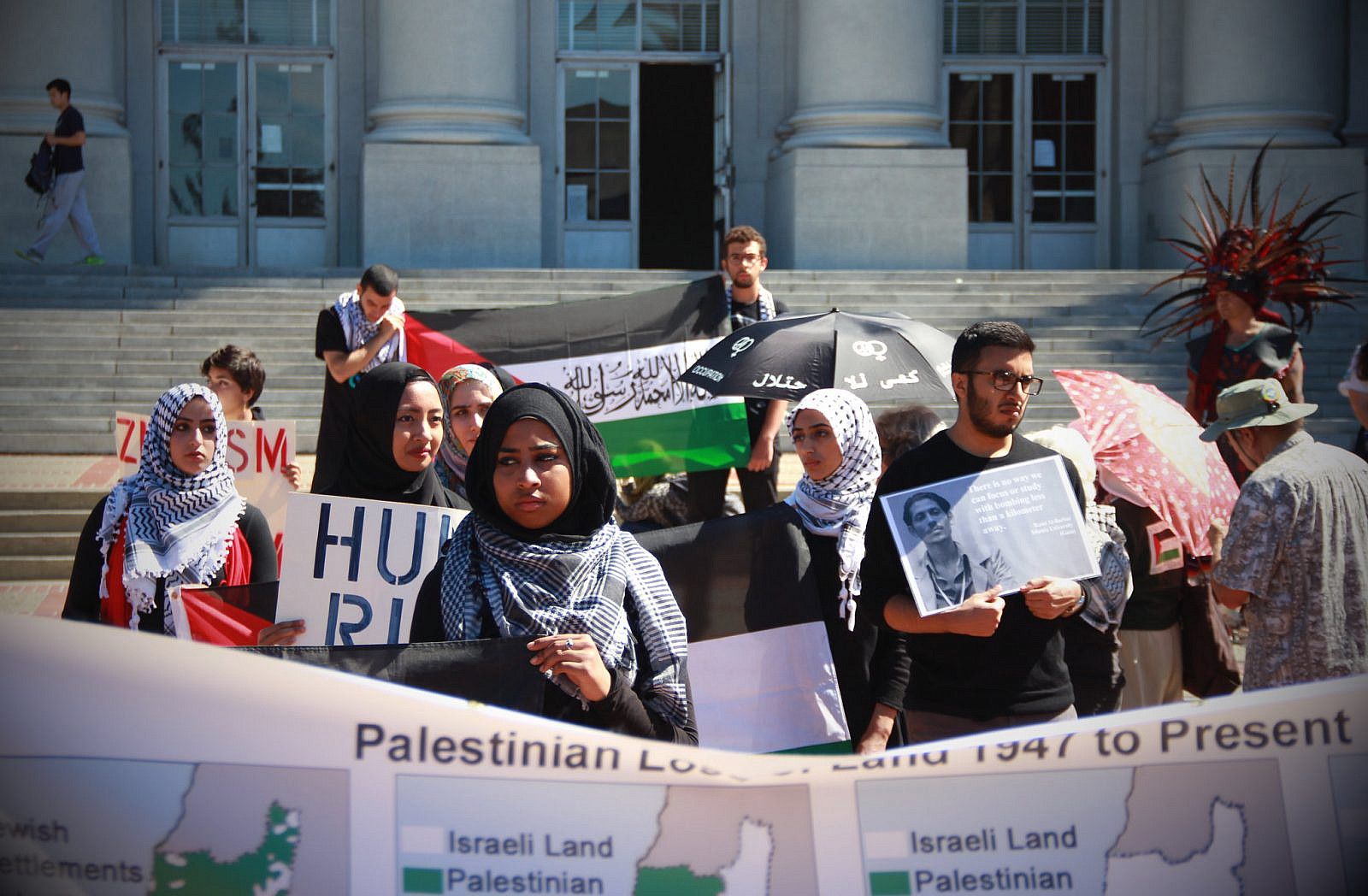In recent years, a growing number of young American Jewish activists have joined the movement for Palestinian rights in the United States, working side by side with Palestinians. For many Palestinians in the movement, this has been a welcome development. Yet at the same time, some feel that American Jews’ lack of previous exposure to Palestinians and the power dynamic between the two groups within American society leads to tensions. These tensions are often left unspoken, bubbling beneath the surface.
Minal, a Palestinian activist, was born and raised in the United States, but had hardly had any interactions with Jews until she reached college and became active with Students for Justice in Palestine (SJP).
“It was the first time in my life that I’d seen people who weren’t Palestinian fighting for the cause, including Jews,” she says. She noted that almost all those Jewish activists were of white Ashkenazi, or European, descent; many Mizrahim, Jews with Middle Eastern roots, often preferred to organize more quietly for fear of being discriminated against and pushed out from Jewish communities for their activism, she added. She didn’t meet Jews of color in those circles.
Minal’s parents moved to the United States soon after the 1967 war. They still have family living in the West Bank, whom Minal regularly visits.
“We’re taught from a young age — especially growing up after 9/11 — to hide our identity, to hide our Arabness, and not to get involved politically, partly because your actions could affect family members back home,” Minal explains, speaking to +972 Magazine on condition of anonymity, both for her personal safety and for the safety of her family in the occupied territories.
Minal avoided being politically active until she reached college, where she became close friends with Jewish activists. This, she says, was a new kind of challenge that “involved learning a lot of new things about Jewish culture that I hadn’t engaged with before,” many of which overlapped with her own Palestinian culture. It was also a source of comfort, she adds, with Jewish colleagues offering crucial support and using their privilege to center Palestinian experiences.
With the movement for Palestinian rights gaining traction in the United States, I asked Minal about the internal dynamics between Palestinian and Jewish organizers, and what good examples of Jewish allyship look like.
The interview has been edited and shortened for clarity.
We want to talk about the relations between Palestinian and Jewish activists within spaces like SJP, in order to make these relations work better. I want you to be honest, and to tell me some things that Jewish activists did that were problematic for you.
One way that Jewish Americans tend to silence me is when their guilt becomes so overwhelming that it becomes the focus of every conversation. For example, I would talk about seeing my young cousins in the West Bank being chased by tanks, and then someone would respond, “I can’t believe they’re doing this in my name, in the name of Judaism.” It shifts the entire discussion from the actual events on the ground to this guilt that centers Jewish people instead.
When there was talk of Israeli annexation of the West Bank last year, I was discussing with a friend’s partner, who is a liberal Zionist, what annexation would mean for my family’s town in the West Bank, which is surrounded by settlements. What would happen to the roads that my family uses? How will they get to places like Ramallah or East Jerusalem to see other family? The liberal Zionist responded, “I’m afraid people are going to use that to be antisemitic.” It was such a strange response: it turned the conversation about my family into a question of “how do I protect you from antisemitism.”

This happened a lot, even with anti-Zionist Jews: a huge fear of antisemitism that overwhelmed everything else. My friend, a non-Jewish Black organizer in the Palestine movement, put it best: she said it’s weird how quickly Jewish people use antisemitism to shut people down, when as a Black person she deals with anti-Blackness constantly in these spaces, and just has to move forward and deal with it respectfully. “That was upsetting because of XYZ. Could you not do that next time?” she would respond. But when a Jewish person, even the biggest social justice warrior, deals with antisemitism in these spaces, the response is, “You’ve offended me, this is the worst thing that could happen.”
What would you have preferred people to do?
If you’re having issues with this guilt, or you felt someone was being antisemitic — don’t go to a Palestinian! We deal with so much shit on our own. Reach out to an older Jewish activist who has a better grasp of how to engage with this. Reach out to your white friends who’ve been dealing with their own white guilt. If you’re going to reach out to a person of color, ask them: “Can you help me deal with this thing? I was really defensive, and I don’t want to be, and I want to improve on that. Would you be willing to help me?” Don’t just unload on people without asking.
What else was hard with them?
One of most frequent, grating occurrences was when I shared real fears about what’s happening in the West Bank and Gaza. The response, especially from Jewish activists, would be a chant of “From the river to the sea, Palestine will be free.” And I’d say, “Sure, but today it’s not. Today is rough, and the future you think is inevitable is not something that I nor most Palestinians even have hope for as a possibility.”
We do this work not because we think everything will eventually be fine, but because we have no other choice. We’re not sure it’s going to work out. So, repeating these chants that aren’t really facing facts feels hollow, ignorant, and boring. This idea of a utopian future where there’s a one-state solution and everyone loves each other — that’s not something I see as a viable way to deal with this grief.
You once told me that a good example of Jewish allyship was allowing Palestinians to mourn.
People will often hear Palestinians speak about traumas in a very monotone, numb, emotionless voice. They think that’s how we’re actually feeling — that we’re not stressed or upset, that we must be okay because we look okay. But this ignores the fact that a lot of Palestinians become very desensitized to violence at a young age. I’ve seen people who look like me die dozens of times. I’ve had family members be sent to jail for something as simple as a student protest. My grandmother’s childhood friend was killed in the 2014 assault on Gaza. Those are things that become normalized after a while; it’s unfortunate, but it’s a fact of trauma.
We also can’t show emotion when we’re arguing with Zionists. You have to be as knowledgeable, academic, and scholarly as possible in order to make those conversations stick. That requires you to shove all your feelings into some hidden place that you can’t often access. When you do access them in public, you end up tokenizing yourself to make people pity you. Pity is an emotion that works, but it’s not who I am or what I want to express about myself. We’re never given a space to feel these emotions; they either well up until they become an extreme burden, or you find a way to let them out.
Something that has worked well for me and the Palestinians in my community has been to mourn publicly. But this can also become a site of violence for Palestinians. We once organized a memorial for everyone who had died in the 2014 Gaza assault, laying a stick for every ten deaths, both Palestinians and Israelis. People broke the sticks and knocked them down. It was very upsetting: it was one of the first times in my life that I was able to mourn publicly, and it was destroyed.
A way that Jewish folks can help is to enable spaces like vigils and memorials where healing is allowed and protected. During a vigil in college for those who died in Gaza’s Return March, the local Jewish Voice for Peace [group] made sure to push out anyone who was not engaging with the vigil respectfully. It’s not flashy activism, but it’s extremely important — it allows us to be people again.
What else can help you feel like a person again?
Many people in the movement make Palestinians feel that their identity is just the violence against them. We stop being allowed to mourn, to breathe, to celebrate. When your entire identity becomes your oppression, it erases everything else in your culture — the foods I grew up with; how I suck at dabke [a traditional folk dance] and how my family makes fun of me for it; how we’re very loud and can’t shut up at parties. Those are pieces of our identity that are just as important as our oppression. Even though it’s very hard to live in the West Bank, my family still has fun — weddings, celebrations, baptisms. But they get swept away to create this narrative of the most sad, distraught, broken people in the world.
Several Palestinians I talked to mentioned the high visibility of Jewish activists in the Palestine movement. What’s your take?
This movement routinely centers Americans as good activists and America as the center of the conflict, ignoring the people in Palestine. But it’s not about us. The goal is to give Palestinians on the ground the power to make choices for themselves. They never stop and ask Palestinians in Palestine: “What do you want from us? What can we do to support you?” It’s always this grandiose vision that “We’ll save the world.”
Within this narrative, Jewish activists tend to center themselves as the head of the U.S. movement against the occupation. For example, Jews are often the heads of organizations like National Students for Justice in Palestine (NSJP). They’re often visible in a way that Palestinians can’t be, and they become the only ones that people listen to and engage with, making them the de facto leaders.
There was a Jewish organizer in my SJP [chapter], for example, who would get all the questions that anyone had about the organization — from reporters, student administrators, people who wanted to get involved — despite the fact that he wasn’t in a leadership role. We were lucky that he was aware of his privilege and would refer to someone else and say, “This is the person who can help you.” Most of the time, if someone isn’t aware of their privilege, they won’t ask the Palestinian in the group; they’ll just answer it themselves, sometimes poorly, and people will take that as SJP’s position.
This was really hard to overcome. Throughout my organizing in college, I specifically avoided being public, including on Facebook. I was rarely out at protests, and if I was, I wore a keffiyeh over my face; in closed workshops, I often went by a nickname. It wasn’t my Jewish allies’ fault, but it was distressing to see them being so public while I couldn’t.
How can Jewish allies do better regarding visibility?
In my experience, one of the best ways to be a Jewish ally is to pretend you’re answering questions while in fact letting someone else do it. One of the things that an organizer in my SJP would do was that, when he received a question, I would type him the answers as if I were him. He would also write articles under his name and ask me “What do you want me to get out there?”
It’s a useful organizing tactic: it empowers my voice without outing me, and it weaponizes your privilege for the movement. The sad fact is that people will listen more to Jewish folks in this movement than to Palestinians. Regardless of how well-mannered we are, we’ll always be seen as a threat. For a lot of American Jews in the movement, there’s a dichotomy between “I have to feel guilty for this privilege” and “I have to pretend it doesn’t exist.” There’s a space outside that binary: “I have privilege and I’m not going to feel guilty for it — I’m going to use it.”
I want to move on to a particularly sensitive subject: you told me it’s hard to express how some Jewish symbols can actually be triggering for you.
This is something that I almost never speak about in any organizing space. When you grow up Palestinian, you grow up scared of Jewish symbols, specifically the Star of David on the Israeli flag. They’re used by settlers to tag and vandalize homes in the West Bank, to mark spaces that are unsafe for us. A synagogue doesn’t have to be Zionist, but many synagogues I’ve seen have an Israeli flag — so I usually avoid them.
This was a lot scarier when I was younger. I was five years old when 9/11 happened, and it became extremely important to never let anyone know I was Palestinian, and specifically never to be near Zionists. The easiest way to avoid that was to look for a Star of David on a building, or look for someone wearing a yarmulke. It’s stereotyping, but it’s the only way we knew to keep ourselves safe.
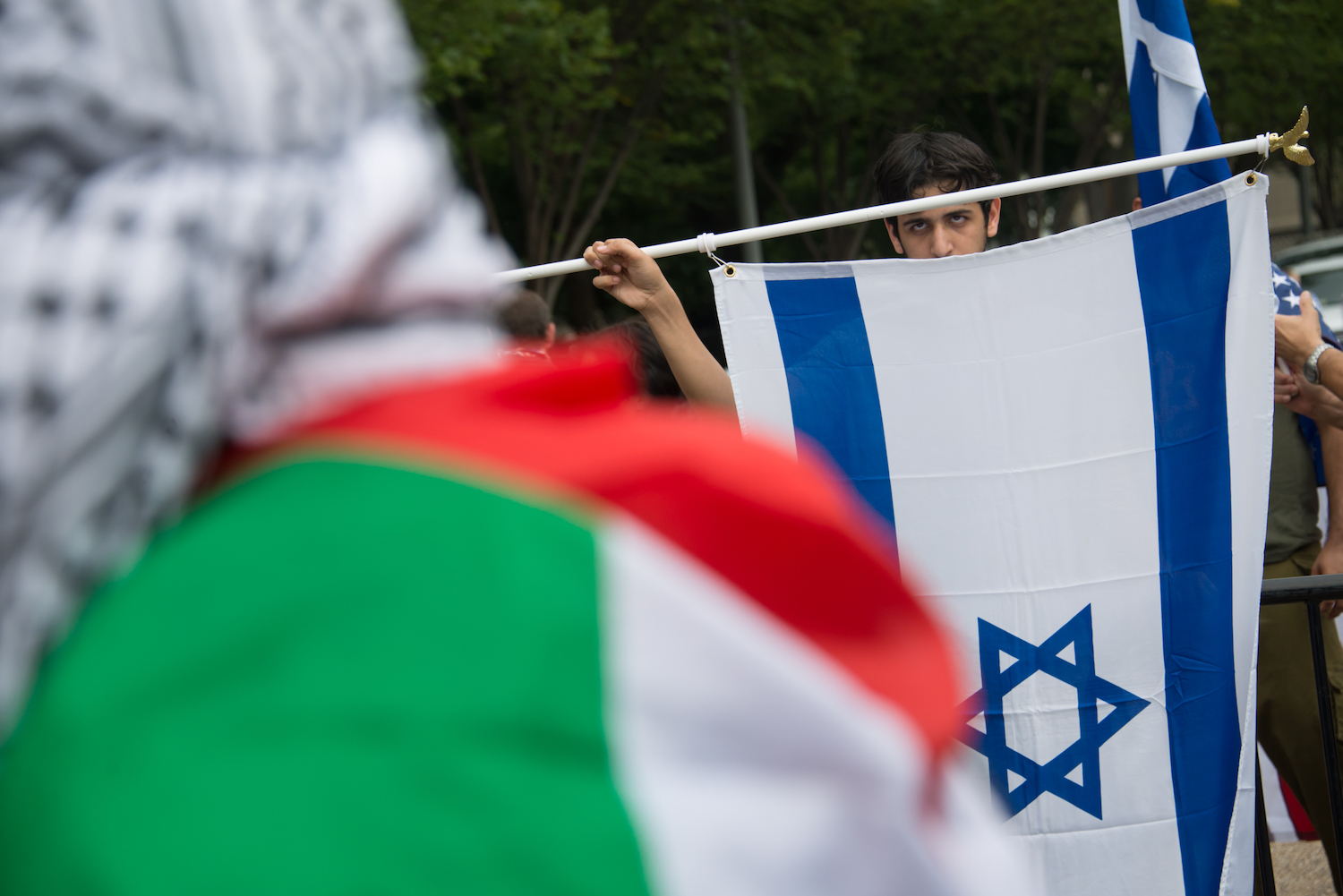
This comes up because my family is very proud of being Palestinian and we often wear some kind of Palestinian sign, like on my keychain or my necklace. A lot of Jewish folks have been taught about this conflict from a very young age — maybe their synagogue, their parents, or a summer camp — so they know what those symbols are. So, it’s risky to be around someone who can call me out for it; you don’t know how that situation might end.
When you think of people demonizing the Star of David, you usually think of white supremacists. This is fair, but it ignores the fact that these symbols are no longer benign, and no longer just symbols of Judaism. They’re symbols of hatred, terrorism, and destruction in many parts of Palestine. This is so hard to talk about in organizing spaces, because it so easily becomes a conversation about “You should just deal with it, because you’re being antisemitic.”
This happened a lot with the Pride Star of David Flag. I talked with someone to explain why that flag is distressing, and why the only people who wave that flag are Zionists. Everyone else I know who’s Jewish and queer knows that that could be scary for Palestinians, so they find something else to symbolize their identities together. My friend had a tattoo with the Star of David and a pink triangle over it, and was wearing a badge saying, “I am both a Jew and a gay man.” This is how he connects these symbols, to reclaim an oppressive tool from Nazi Germany. It’s clear he’s not using the Star of David as a propaganda measure.
I’m not afraid of every Star of David. There’s a specific version that’s scary: the one that looks like the Israeli flag, that you put on a Pride flag, that you see on synagogues. This is so hard to explain to people because they say, “You’re telling me I’m doing Judaism wrong,” or “You’re telling me I have to hide who I am.” I’m really, really not. It’s a scariness I’ve pretended I don’t feel for years, even in the most anti-Zionist spaces.
I know I have antisemitic biases — I grew up in the same American culture as everyone else, a culture that is antisemitic — and I do work on them. When I was part of SJP, I made sure we had an antisemitism workshop every semester. I tried my best to study antisemitism and its history, to understand where these biases come from, and how to be aware of them. How do I address someone who believes the “Greedy Jew” myth, or a Rothschild or Soros conspiracy theory? I will always commit to that work, but it’s separate from the trauma induced by Jewish symbols.
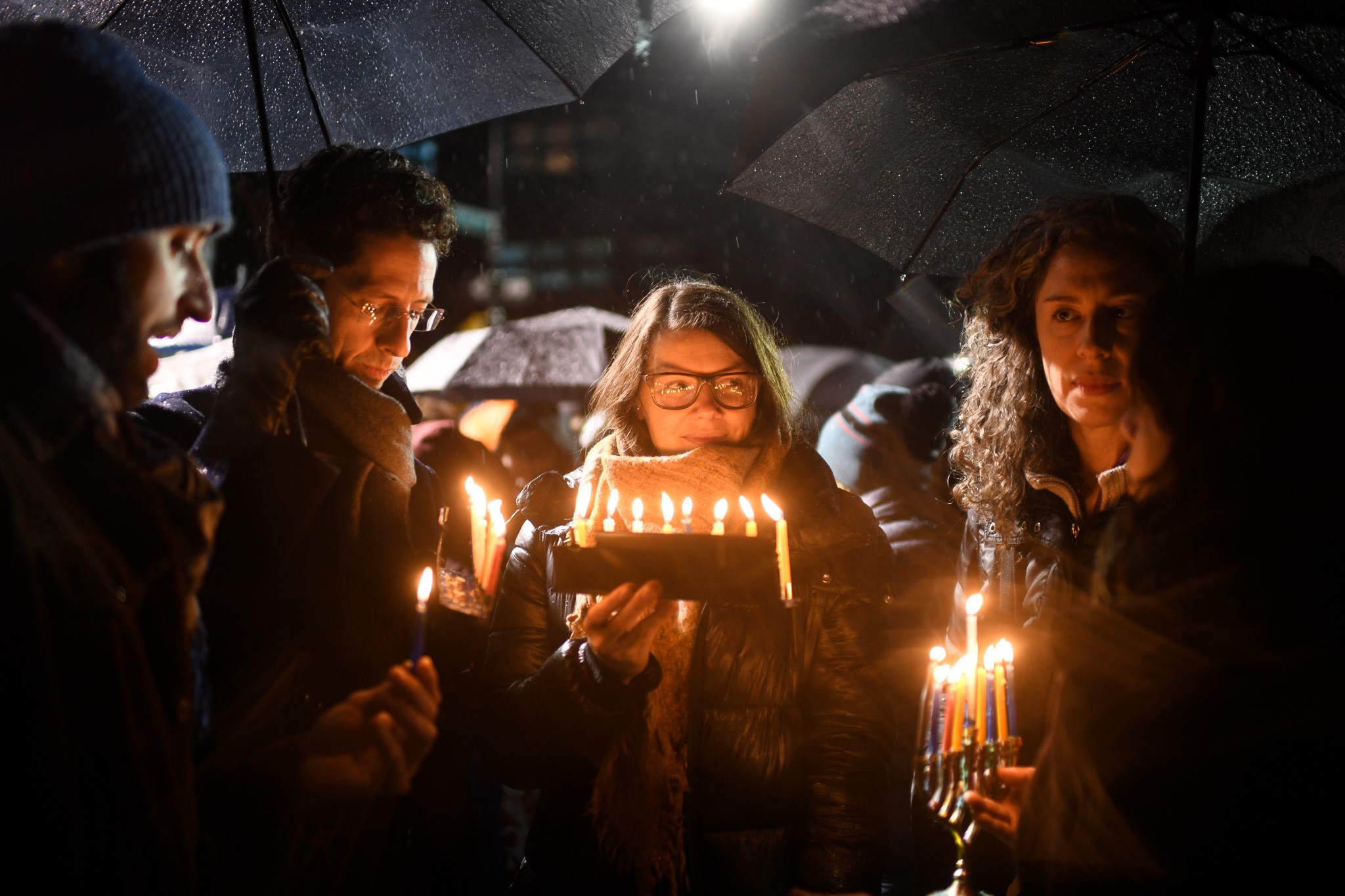
This is also true of Hebrew, which is upsetting because it is so similar to Arabic and I really want to learn it. But it’s hard to hear a language that is used to terrorize your family. I remember when settlers carried out an attack on the homes of my family members, writing graffiti in Hebrew with a Star of David, which has been happening in our town for years.
I was taught growing up that we call Jewish folks “our cousins.” There was a kinship that was very important to my family, even though we couldn’t act upon it. There were stories from my grandfather: “I remember when I was in Jerusalem in the 1930s, and Jews, Christians, and Muslims lived there together. It wasn’t a big deal.” That history is important. Jews in America need to realize what settlers are doing to the way we see Jewish folks.
We’ve covered a lot of the sources of tensions. What’s your favorite example of being supported by a Jewish activist?
I had a Jewish friend in SJP who didn’t want to take on a major role in the divestment campaign, but decided that he would instead check in on people. He would text the people working on the divestment resolution: “Have you eaten? Did you drink water? Have you taken a break?” He took it 10 steps further on the day of the divestment vote, which went on for hours, and decided he would sit next to me the entire time to take care of me. After he dropped me home, he told me “Don’t stay up. Mute the SJP group conversation. Don’t engage, because it’s not going to make you feel better, it’s going to make you more stressed.”
My friend can never put this on a history of his activism. It’s a simple act of care and kindness. So much of activism in the United States is about the flashy parts, and I think a lot of Jews in this movement buy into that. They want to be exciting, to feel part of something big. But sometimes that just means taking care of your community; to just be a good friend.
What do you think is the value of being more aware of these issues?
I think that if people took these things into account, more Palestinians would be involved in the movement. Palestinian organizers in the United States are few and far between. I’ve seen some SJPs that had no Palestinians in them. This is partly because it’s scary to be a Palestinian organizer, but it would be a lot less scary if these spaces were safer and more comfortable. You’re in a space where you’re either heavily tokenizing yourself for the sake of making a point, or you’re constantly having to walk on eggshells.
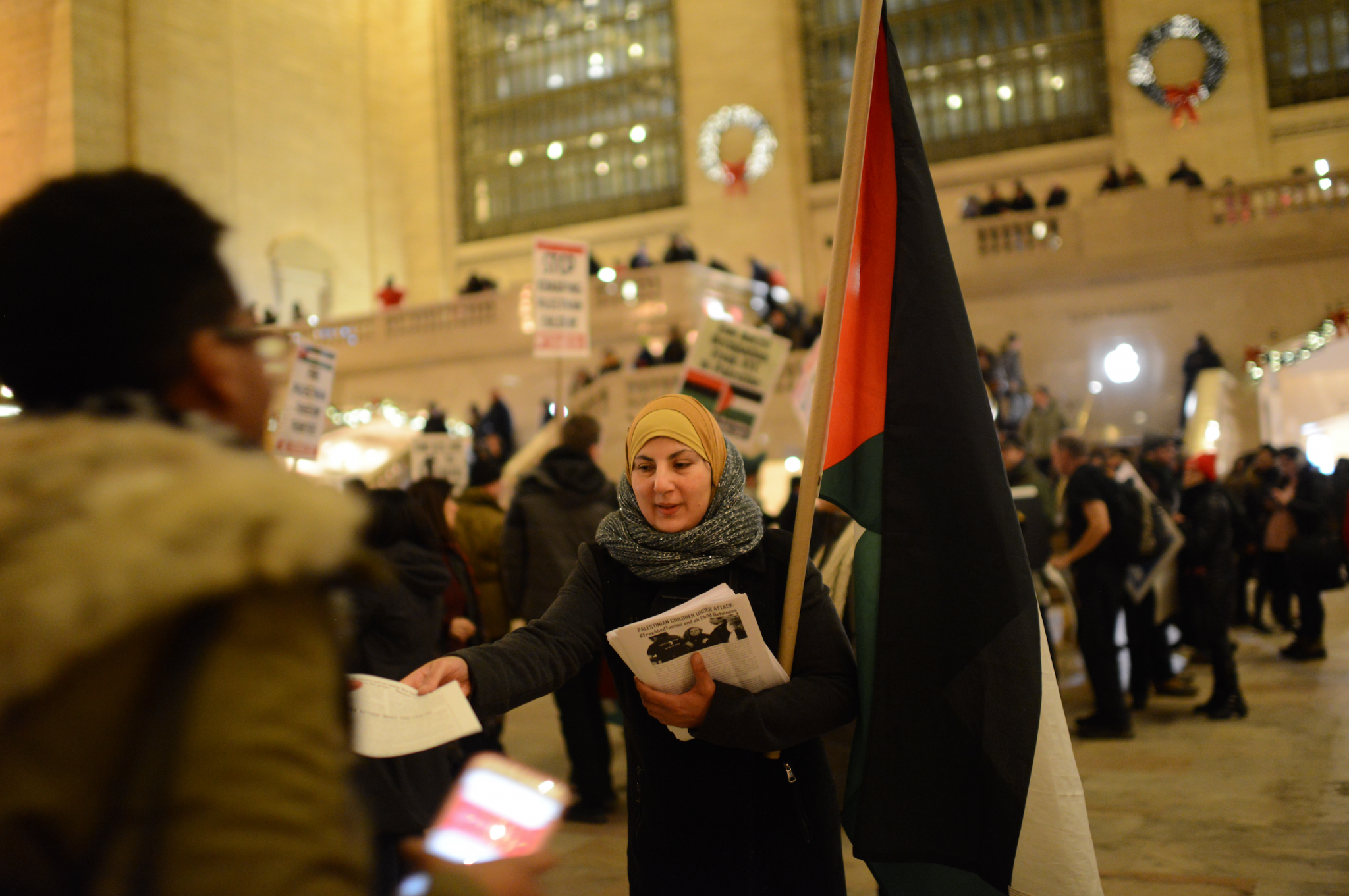
Because of these issues, we Palestinians don’t speak to what’s going on sometimes — what’s upsetting us, what we’re feeling, or what we would like the organization to do. We’re afraid that if we say something, someone in the group will call us antisemitic, or will think our group is too radical. I have to make a calculation in my head every time I want to share an idea or express something that isn’t fully formulated.
Often the only way Palestinians can speak is if we are at our utmost in terms of eloquence, knowledge, and academic language. It stifles us from talking about things before we’ve figured them out. When there are Jewish activists working with Palestinians, please treat them with kindness. This is a very hard space and a very hard balance to draw. We’re not always eloquent, we’re not always going to say it in the perfect way. Your gut reaction of being defensive? Try to hold it back. It’s important for Jewish activists to give Palestinians the benefit of the doubt when you can. We’re really doing our best, and we could use an ounce of grace and forgiveness when we’re trying to articulate ourselves. We’re not given that chance anywhere else. When we speak to Zionists, we have to be perfect. Please don’t make us do that within the Palestine movement too.

